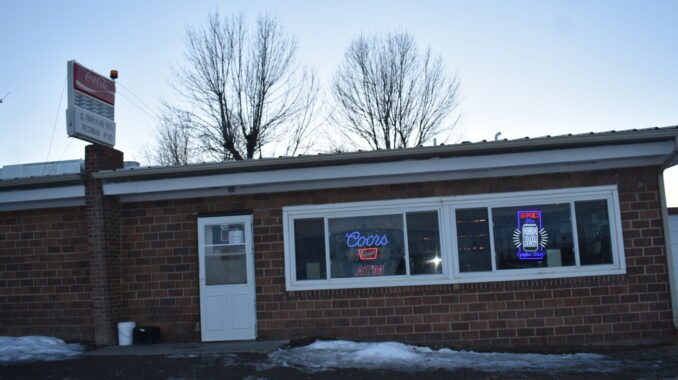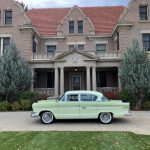News – Sheridan Media
The small town of Parkman lies between Ranchester and the Montana line on Highway 345. Today, it is a town of around 180 population as per the 2020 census. There is a post office and the Parkman Bar and Grill, which draws several local people all year around and many tourists in the summer months.
According to the history printed on the Parkman Bar and Grill menu, Parkman started its life in 1888, when Thurston Akins, who later built the Kirby Opera House in Sheridan, applied to the United State Government to establish a new post office to be named Akins.
The government did not grant him the name, but he did receive permission to establish a post office with the name of Pass, Wyoming. At one time Pass or Pass City was said to have 27 saloons. Beside the post office, Akins also operated the Pass City Hotel. Pass City was a stage stopover on the Bozeman Trail, until travel on the trail was halted.
The name was later changed to Parkman, after the explorer and historian Francis T. Parkman. According to the information on the menu, “Parkman was a lively little town in it’s heyday, but its possibilities as a large community center melted away as automobiles replaced horses.”
Parkman Post Office
In the mid-1980s the final section of interstate 90 was completed between Ranchester and the Montana line. The interstate by-passed Parkman, taking much of the tourist trade away as well.
In The Enterprise, on January 22, 1898, the correspondence talks about the Parkman area.
The circulation of The Enterprise through the three northern precincts of this county visited by your correspondent – Dayton, Parkman and Slack, speaks volumes for the intelligence of the people and the enterprise of the editor.
There are not a dozen homes or businessmen and ranchmen in the sections mentioned at which The Enterprise is not a weekly visitor, and the writer wishes to make public acknowledgment of the uniform courtesy and hospitality with which he was received as a humble representative of the Press.
Slack is a well situated business point on South Pass Creek and has a store well-stocked with general merchandise, a daily mall, a new and neat church, a good school, a blacksmith shop and a fertile area well settled to draw to.
We also had the pleasure of making the acquaintance of Mr. T. A. Powers, who kindly invited us to share his hospitality for the night, an invitation we willingly accepted. He is a checker player of renowned……Mr. Powers is a gentleman of rare conversational gifts and the hours spent in society were a means of entertainment and instruction.
He makes the best use of natural, advantages and exhibited a turbine wheel in his washroom which is supplied with water by a flume from an irrigating ditch and runs washing machine, wringer, feed mill and churn. He also has three fishponds so connected that he is able to drain one into another if desired, keeps the different sizes of fish separated as a shepherd separates his flocks. He has a fine tract of bottom land on Pass Creek.
Mr. Thurston Akins is one of the old timers and has a fine body of land on Twin Creek below the forks. His residency is all that is left of the old town of Pass. He was formerly the postmaster at Pass and kept a general store from 1889 to 1894. Upon the removal of the town to Parkman he sold his stock of goods to S.E. Mills & Co.,and now confines his business to ranching.
View from Parkman
There was a lot of activity around Parkman during the early 1900s. One was the irrigation project.
This from The Daily Enterprise, September 8, 1910. To Irrigate 12,000 Acres of Sheridan County Land A Canal Thirty-Five Miles in Length is Projected To Embrace “Parkman Irrigation District” A. Lincoln Fellows, an eminent and renowned civil engineer of the Denver firm of Field, Fellows & Henderslider, will pass through Sheridan this afternoon for Parkman, where he will go the over the field survey and notes of Arnold Tschirgi, a local engineer, and will give his decision on the feasibility, estimated cost, and the amount of ground to be benefited by the projected 35-mile canal in that vicinity.
This project embraces 12,000 acres of land in the Parkman district, which is called the “Parkman Irrigation District,” and is owned by freeholders in that vicinity. The land embraced in this vast acreage is some of the richer agricultural soil in the state. It is a dark, sandy loam with a heavy clay subsoil and can grow most anything if sufficient moisture is secured. W. H. Wallace of Sheridan is the man who saw the feasibility of taking water from Tongue River, 35 miles distant, and carrying it to this district by this giant canal. This was three years ago and since that time he has constantly been exerting his efforts to have the district perfected.
Arnold Tschirgl of Sheridan was secured to survey the project and give his estimate as to the cost of the long canal. After spending several weeks in that neighborhood going over the ground and examining every phase of the situation he finally made an estimate of $150,000 as the cost of the canal to convert the water down the valley and distribute it over the rich rolling hills and their gentle slopes
It was estimated it would cost $13 an acre to put water on this small area of rich agricultural land, but the benefits to be derived would more then enhance the value many times that amount. This year some of the soil has yielded from a 40 to 50 bushels on an acre and this, considering the extreme dryness of this season.
Mr. Wallace thought the land would do twice that well if properly irritated. The terminal of this giant irrigation ditch of 35 miles would be at Six Mile Creek. Several businessmen are interested in the project, which has been approved by the state engineer.
Parkman, being along the railroad track, saw its’s share of train wrecks, like this one reported in The Newcastle Democrat, February 21, 1895. Off The Track – Passenger train No. 42 from Billings was derailed about 1 o’clock Sunday between Ranchester and Parkman. The entire train was thrown from the track and the engine, baggage car and smoker tipped over. Fortunately no one was injured.
The story of Parkman
And this story from the The Enterprise, January 19, 1906, Wreck On The Burlington – Engine Demolished and Seven Cars of Coal Go Into the Ditch. Last Monday a west-bound coal train ran into a disabled engine on the main track near Aberdeen, Montana, and the engine and seven cars of coal were wrecked. The light engine, in charge of Engineer Welch, had double headed the coal train over the Parkman Hill and then pulled ahead, presumably to double head passenger train No. 42 up the Parkman Hill from the north. Before reaching Aberdeen the light engine lost a main rod key and stopped. The fireman was sent back to flag the coal train, but it was following so close that it could not be stopped in time to avert the accident. Fireman W. C. Roberts of the coal train was considerably bruised, but not seriously injured. East-bound passenger train No. 42 was held up at Aberdeen and delayed 21 hours.
Snow storms created problems as well, just as they do today. Last January, 2023, I-80 experienced snow, wind and drifting snow and many people were stranded in Southeast Wyoming waiting for the storm to moved out. Even trains sometimes had trouble moving in a Wyoming snow storm.
This from The Sheridan Post, January 29, 1918 The Worse Is Coming – Sheridan today is in the throes of one of the worst storms that has visited this section in years. Last night the government station registered a temperature of only two degrees below zero, but early this morning the mercury began to drop and this afternoon it is ten below. A gale is also blowing and a further drop in temperature is predicted. Fifteen to twenty below is promised for tonight.
Communication with the outside world is practically cut off. Passenger train No. 13 was at Ranchester all afternoon unable to negotiate the drifts on the Parkman hill. Three engines with snow plows were doing their best to get through but at last reports were gaining little on the drifting snow. “The worst Is yet to come,” is the only consolation offered by the weather bureau. A cold wave of the coldest kind is sweeping down from the north and as yet Wyoming has felt only the edge of it. Tomorrow we may expect real winter weather.
Today, Parkman has a post office, a few residents and the Parkman Bar and Grill. The Parkman Bar has been a local concern for many years,. The original Bar was built in 1894, and the current building has been in use since 1955. The owners today are Carolyn Cox and Patricia Caywood, who purchased the business last year.
Jared Gill, patron and Carolyn Cox, part owner of the Parkman Bar and Grill
Cox said the bar does well, but sometimes the weather creates a problem for people traveling. “We get a lot of tourists in the summer, hunters in the fall and snowmobilers in the winter. One guy from New Mexico stops by here every year.”
There is also a great deal of local business all year around.
So, take a trip back into the past at the Parkman Bar and Grill. Food, drinks and local conversation sure to enliven any day.
Last modified: February 11, 2023





